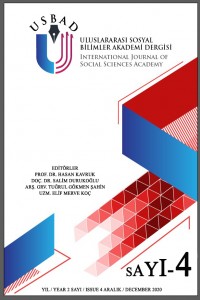Öz
Anahtar Kelimeler
Destekleyen Kurum
Hiç bir kurumdan destek almadım.
Proje Numarası
-
Teşekkür
Makalemin yayımlanması sırasında ücret almadığınız için teşekkür ederim.
Kaynakça
- Akhmedov, A., Zhuravskaya, E. (2004) Opportunistic Political Cycles: Test in a Young Democracy Setting. The Quarterly Journal of Economics, 119 (4): 1301-1338.
- Avrupa Komisyonu (2020) Tüketici eğilim istatistikleri aylık soru formu,https://ec.europa.eu/info/sites/info/files/questionnaires_tr_cons_tr.pdf, ET. :12.08.2020.
- Caleiro, A., Difonsio, A. and Ramalho, E. A. (2011). Explaining consumer confidence in Portugal. Journal of Economic Psychology, 32, pp. 25-35.
- De Boef, S. and Kellstedt, P. M. (2004). The political (and economic) origins of consumer confidence, American Journal of Political Science, 48(4), pp. 633-649.
- Fransa Ulusal İstatistik ve Ekonomik Çalışmalar Enstitüsü (INSEE) (2017), Purchasing Power Slows Down, While The Outlook Remains Positive,https://www.insee.fr/en/statistiques/2662664?sommaire=2662688&q=Electoral+periods+have+a+positive+albeit+short-lived+effect+on+household +confidence, ET. :08.08.2020
- Frey, B., Schenider, F. (1978) An Empirical Study of Politico Economic Interaction in the United States. Review of Economics & Statistics, Vol 60: 174-183.
- Mačkić V., Sorić P., Lolić I. (2017) Competitiveness, consumer confidence and election outcomes, Efzg Working Paper Series, No. 17-04 Zagreb, Croatia.
- Marc B., Reuter A. (2018) “The Effect of Elections on Consumer Confidence in Europe”, European Commission – Discussion Paper 90.
- Suzuki M. (1992) Political Business Cycles in the Public Mind, The American Political Science Review, Dec., 1992, Vol. 86, No. 4 (Dec., 1992), pp. 989-996
- The Conference Board (2011) Consumer Confidence Index, https://conference-board.org/pdf_free/press/TechnicalPDF_4134_ 1298367128.pdf, ET. :11.08.2020
- Türkiye İstatistik Kurumu (2020) Tüketici güven endeksi metaverisi http://www.tuik.gov.tr/PreTablo.do?alt_id=1104, ET. :12.08.2020
- Türkiye İstatistik Kurumu (2020) http://www.tuik.gov.tr/ PreHaberBultenleri.do?id=33907, ET.:12.08.2020
- University of Michigan (2020) Surveys of Consumers https://data.sca.isr.umich.edu/fetchdoc.php?docid=24774, ET. :14.08.2020
- Yun L. (2011) Consumer Confidence And Election Results, The National Association Of Realtors,https://www.nar.realtor/blogs/ economists-outlook/consumer-confidence-and-election-results, ET. :12.08.2020
Öz
Consumer confidence index (CCI) is an important data that has a long history in developed countries and is produced in almost every country. In our country, this index is published as calculated from data of consumer tendency survey by Turkey Statistical Institute (TURKSTAT) since December 2003. With this study, it is aimed to investigate whether there is a correlation between the monthly values of the index calculated in Turkey since 2003 and done in Turkey the votes of the ruling party in the parliamentary elections, the election of members to the provincial assembly in local elections, the plebiscites and the presidential elections. The relationship between the consumer confidence index and the elections in Turkey has not been studied so far. The findings obtained show that there is a very strong relationship between the voting rates of the ruling party and monthly index values.
Anahtar Kelimeler
Proje Numarası
-
Kaynakça
- Akhmedov, A., Zhuravskaya, E. (2004) Opportunistic Political Cycles: Test in a Young Democracy Setting. The Quarterly Journal of Economics, 119 (4): 1301-1338.
- Avrupa Komisyonu (2020) Tüketici eğilim istatistikleri aylık soru formu,https://ec.europa.eu/info/sites/info/files/questionnaires_tr_cons_tr.pdf, ET. :12.08.2020.
- Caleiro, A., Difonsio, A. and Ramalho, E. A. (2011). Explaining consumer confidence in Portugal. Journal of Economic Psychology, 32, pp. 25-35.
- De Boef, S. and Kellstedt, P. M. (2004). The political (and economic) origins of consumer confidence, American Journal of Political Science, 48(4), pp. 633-649.
- Fransa Ulusal İstatistik ve Ekonomik Çalışmalar Enstitüsü (INSEE) (2017), Purchasing Power Slows Down, While The Outlook Remains Positive,https://www.insee.fr/en/statistiques/2662664?sommaire=2662688&q=Electoral+periods+have+a+positive+albeit+short-lived+effect+on+household +confidence, ET. :08.08.2020
- Frey, B., Schenider, F. (1978) An Empirical Study of Politico Economic Interaction in the United States. Review of Economics & Statistics, Vol 60: 174-183.
- Mačkić V., Sorić P., Lolić I. (2017) Competitiveness, consumer confidence and election outcomes, Efzg Working Paper Series, No. 17-04 Zagreb, Croatia.
- Marc B., Reuter A. (2018) “The Effect of Elections on Consumer Confidence in Europe”, European Commission – Discussion Paper 90.
- Suzuki M. (1992) Political Business Cycles in the Public Mind, The American Political Science Review, Dec., 1992, Vol. 86, No. 4 (Dec., 1992), pp. 989-996
- The Conference Board (2011) Consumer Confidence Index, https://conference-board.org/pdf_free/press/TechnicalPDF_4134_ 1298367128.pdf, ET. :11.08.2020
- Türkiye İstatistik Kurumu (2020) Tüketici güven endeksi metaverisi http://www.tuik.gov.tr/PreTablo.do?alt_id=1104, ET. :12.08.2020
- Türkiye İstatistik Kurumu (2020) http://www.tuik.gov.tr/ PreHaberBultenleri.do?id=33907, ET.:12.08.2020
- University of Michigan (2020) Surveys of Consumers https://data.sca.isr.umich.edu/fetchdoc.php?docid=24774, ET. :14.08.2020
- Yun L. (2011) Consumer Confidence And Election Results, The National Association Of Realtors,https://www.nar.realtor/blogs/ economists-outlook/consumer-confidence-and-election-results, ET. :12.08.2020
Ayrıntılar
| Birincil Dil | Türkçe |
|---|---|
| Bölüm | Araştırma Makaleleri |
| Yazarlar | |
| Proje Numarası | - |
| Yayımlanma Tarihi | 22 Aralık 2020 |
| Kabul Tarihi | 2 Aralık 2020 |
| Yayımlandığı Sayı | Yıl 2020 Sayı: 4 |
Cited By
Uluslararası Sosyal Bilimler Akademi Dergisi (USBAD), İnönü Üniversitesi Eğitim Fakültesi Türkçe ve Sosyal Bilimler Eğitimi Bölümü Yerleşke / Malatya
Telefon: 0533 5438933, https://dergipark.org.tr/tr/pub/usbad -- sdurukoglu@gmail.com -- usbaddergi@gmail.com


